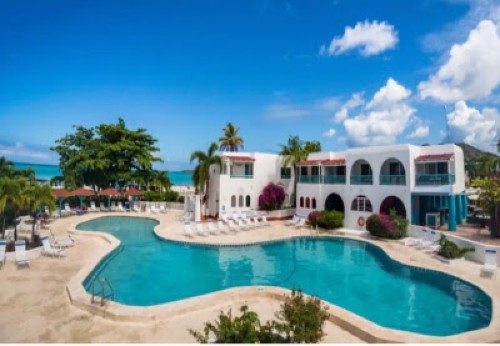ST. JOHN’S, Antigua - The Antigua and Barbuda government is defending its decision to transfer and redevelop the Jolly Beach Hotel as part of the efforts to ensure the long-term sustainability of the country’s National Social Security Scheme (NSSS).
 “A sustainable pension system requires more than just savings accounts. It requires strategic asset allocation and proactive investment to meet future obligations,” said Prime Minister Gaston Browne, noting the policy decision will not only enhance the NSSS’s revenue base, but also restore a key national asset, create jobs, and boost tourism.
“A sustainable pension system requires more than just savings accounts. It requires strategic asset allocation and proactive investment to meet future obligations,” said Prime Minister Gaston Browne, noting the policy decision will not only enhance the NSSS’s revenue base, but also restore a key national asset, create jobs, and boost tourism.
The government said the resort, located on 27 acres of prime beachfront land is valued at EC$67 million (One EC dollar=US$0.37 cents), will be utilized to settle part of an EC $330 million delinquent government bond owed to the Social Security Board.
The bond, issued in 2010 under a previous administration, has remained non-performing for over a decade, compromising the Scheme’s financial health and its ability to meet pension obligations.
“This is more than a real estate transaction. It is a transformational move to repair past fiscal failures and to position our Social Security Scheme on a path of solvency and prosperity,” Browne said.
In defending the decision of his administration, Prime Minister Browne said that the government’s multi-pronged investment strategy is designed to unlock revenue from both existing and new hospitality infrastructure.
Under the plan, 315 rooms will be sold under the Citizenship by Investment Programme (CBI) through which foreign investors are entitled to citizenship of the country in returning for making a substantial investment in its socio-economic development.
The authorities anticipate that the sale would net an estimated EC$200 million after administrative costs.
They said an additional 200 rooms will be constructed on 10 acres of the property, financed through an EC$75 million public investment, and sold at EC$1.3 million per unit, also projected to generate EC$200 million in net revenue.
The government said that the total expected revenue over a 10-year period is EC$400 million, with an average annual yield of EC$40 million.
It said this significantly outpaces passive investment options, such as bonds or term deposits, which typically yield around two per cent, or just EC$2.8 million annually on a comparable EC$142 million investment.
The government said that even under more conservative projections, with revenues discounted by 50 per cent, the investment would still produce an annual return of EC$20 million, or EC$17.2 million more than the passive strategy.
“This is the kind of smart, forward-thinking investment that ensures Social Security isn’t just surviving, but thriving,” Browne said.
The government said that the plan also provides a layered structure of financial stability with hotel operations, currently generating EC$4 million in annual profits, are expected to grow to EC$10 million post-development and that maintenance and upkeep will be funded by monthly homeowners’ fees of EC$1,000 per unit, projected to bring in six million EC dollars annually.
Prime Minister Browne described the investment as a critical pillar of his government’s broader vision to build a resilient, inclusive, and economically independent Antigua and Barbuda.
“We are charting a new course where public assets work for the public good, and where we move beyond dependency and despair into ownership, growth, and prosperity.
“We are securing the future for our pensioners, building national wealth, and creating opportunities for generations to come. The ABLP (Antigua and Barbuda Labour Party) government will deliver,” Browne said.
But Opposition Leader Jamal Pringle, who cited previous failed investments has questioned the administration’s ability to manage public funds, expressing serious concerns about the investment strategy, pointing to past failures.
“First and foremost, you would have seen they pumped Social Security monies into a housing scheme which has yielded no return to the Social Security,” he told the Observer newspaper.
“We have no confidence in the government’s ability to manage these resources and to see any tangible benefit coming from it. Again, this government has been riddled with a lack of accountability when it comes to public funds. Social Security is a cash-based organization, and it needs the revenue to continue to pay its beneficiaries,” he added.


